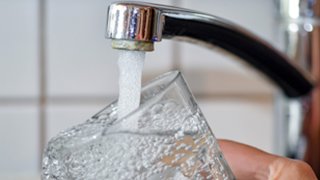
New Hampshire's governor signed into law a bill Thursday that sets some of nation's toughest drinking water standards for a group of toxic chemicals and provides tens of millions of dollars for cleanup cost.
The bill includes standards put forth last year by the state Department of Environmental Services for potentially harmful chemicals called perfluoroalkyl and polyfluoroalkyl substances, also known collectively as PFAS. The standards limit one chemical to a maximum of 12 parts per trillion and another to 15 parts per trillion, far lower than the 70 parts per trillion the federal Environmental Protection Agency has advised for the chemicals.
"We do have a PFAS problem in the state, and we've always said we don't want a problem to become a crisis," Sununu told reporters.
The bill was inspired by a lawsuit filed last year by 3M, a farmer and several others who are trying to block the standards from taking effect. A judge in the case issued a temporary injunction in December that prevents the standards from being enforced.
"The community of Merrimack and all Granite Staters impacted by PFAS contamination can begin to breathe a sigh of relief today," said Rep. Wendy Thomas, a Democrat from Merrimack which has been impacted by PFAS contamination. "Democratic legislators heard years long ignored cries for help and rose to the challenge to answer them. This legislation will begin the process of reparations for communities that have lost so much life and quality of health to these toxic contaminants."
Rep. Renny Cushing, a Hampton Democrat, said Sununu's action was "a great day for clean, healthy drinking water in the state of new Hampshire" and "great news for municipalities who will be able to clean up their drinking water."
The NH Municipal Association supported the bill. But Opponents complained the $50 million in loans included in the bill to help communities with remediation efforts is less than a fifth of the estimated cost of such an undertaking.
Business groups also came out against the bill, complaining that it would saddle communities with extraordinary costs and set standards not supported by the science.
The loans to communities could be paid back if the state reaches a settlement with the eight companies, including 3M and the DuPont Co., that it has sued, accusing them of being responsible for damage caused by PFAS.
The standards were inspired by widespread PFAS contamination across the state. Hundreds of homes in New Hampshire, whose drinking water was contaminated by PFAS have been connected to new water. The state estimates more than 100,000 other people eventually could have contaminated water.
Studies have found potential links between high levels in the body of one form of the contaminants and a range of illnesses, including kidney cancer, increased cholesterol levels and problems in pregnancies. In the case of New Hampshire, the state lowered the standards it proposed after reviewing a study that found toddlers could be exposed to PFAS through breast milk.

